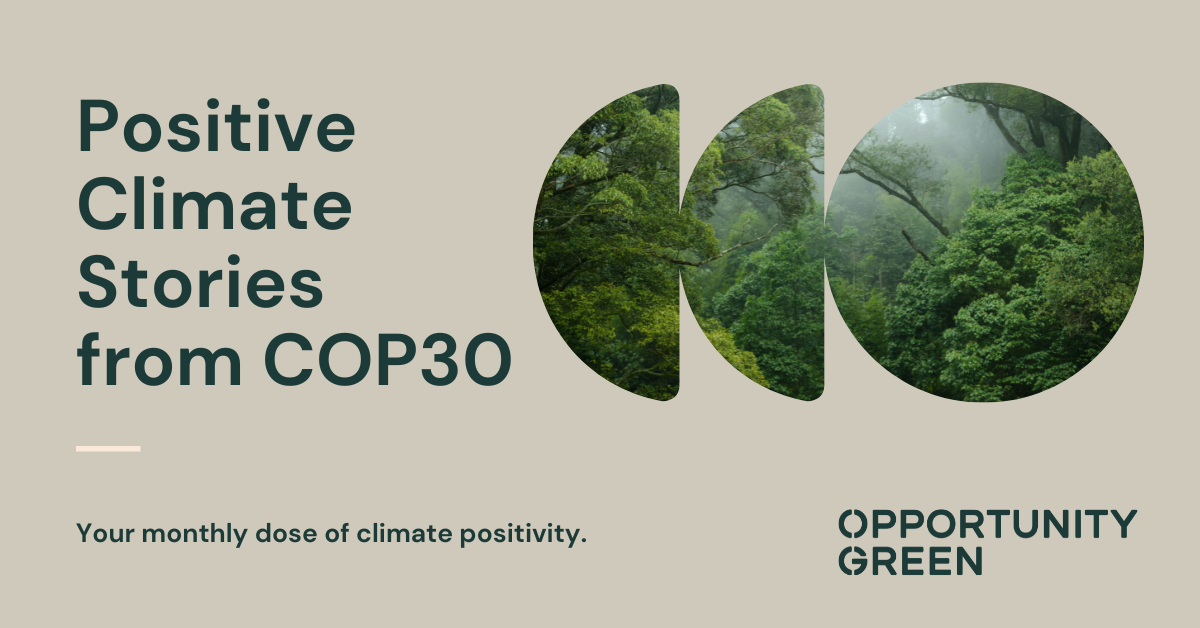Positive Climate Stories in June
June brought plenty of progress on climate – from a new coalition to tax premium air travel, to a sharp decline in deforestation in Colombia. This month’s round-up features legal wins for ecosystems, new science on solar and soil and even a bonus story from our own office that shows how sustainability shapes even our creative work.
Story of the month
1. Eight countries form new solidarity coalition for levies on premium flyers
Against a backdrop of increasing geopolitical hostility, it is hard to see how global progress can be made that meets the scale and the pace demanded by the climate crisis. Enter the Global Solidarity Levies Taskforce to show us the way. The Taskforce – spearheaded by the governments of France, Kenya and Barbados – was launched at COP28 in November 2023 to identify scalable and sensible options for levies to raise additional resources for climate and development.
Following a consultation of potential options earlier this year, the taskforce announced this week at the Financing for Development (FFD4) Conference in Sevilla a coalition of countries willing to tax premium air travel (first- and business- class tickets, and private jets). Agreements from the governments of France, Kenya, Barbados, Spain, Somalia, Benin, Sierra Leone and Antigua & Barbuda have committed to work towards COP30 in Brazil on equitable contributions from this high-emitting sector to provide climate and development finance. Recent research by CE Delft shows that global levies on premium flyers could raise as much as $78bn per year.
This initiative is a hopeful step forward in improving aviation’s poor record on climate and equity. Just 1% of the world’s population accounts for more than half of the CO2 emissions from commercial aviation. Meanwhile, private aviation has seen a 49% increase in emissions between 2019-2023 and kerosene is dramatically undertaxed compared to the duties of on road transport. This is fundamentally an issue of equity and fairness. We welcome these eight countries on launching this bold and much-needed coalition and urge others to follow their lead.
2. EU court backs fishing restrictions in marine protected areas
The General Court of the European Union has upheld restrictions on all damaging fishing practices such as bottom trawling across marine protected areas throughout the EU.
VDK, a German fishing group, challenged the EU’s 2022 decision to limit bottom trawling, a practice in which boats drag large, weighted nets across the seafloor to catch fish. Bottom trawling accounts for approximately one-quarter of all fish and seafood caught annually and is known to harm the marine ecosystem by reducing seafood stocks and increasing carbon footprint.
The General Court has now upheld the Commission’s restrictions, deeming them valid and dismissing VDK’s challenge. This victory sets a precedent across the EU with implications for biodiversity law and future marine conversation cases.
Meanwhile, the UK proposed a wider ban on bottom trawling in protected areas.
3. Colombia cuts deforestation by one-third
Columbia saw a 33% drop in deforestation during the first quarter of 2025 compared to the same period last year. Environment Minister Lena Estrada Añokazi reported this drop was due to community coordination and a crackdown on environmental crime.
Deforestation fell from 40,219 hectares in early 2024 to 27,000 hectares this year, with the largest reductions seen in the Amazon’s national parks.
While deforestation dropped overall, pressure on protected areas remains intense. Illegal coca cultivation and unregulated mining continue to advance into national parks.
Looking ahead, Estrada cited a national action plan to further engage law enforcement and local communities. Regional meetings have been set in June to deepen collaboration with Indigenous and territorial leaders to reinforce conservation measures.
4. Poultry megafarm halted for failing to consider environmental impacts
In Shropshire, planning permission for an industrial chicken unit containing 230,000 birds was quashed by the court for failing to consider all the farm’s environmental impacts.
The case argued that a rise in large intensive poultry units in the valleys of the Rivers Wye and Severn was a key cause of river pollution. Chicken droppings contain more phosphates than any other animal manure. When it rains, the phosphates run into streams and rivers, and cause algae. It can starve fish and river plants of oxygen and cause river water to turn green.
This is a big issue in the area. More than 51 million chickens are being industrially farmed in the river valleys of the Severn and Wye – the equivalent of 79 chickens for every person in the region.
Intensive poultry farming is already blamed for devastating the River Wye, a site of special scientific interest. Its ecological status was downgraded last year by Natural England from “unfavourable – recovering” to “unfavourable – declining” because of phosphates, nitrates and ammonia pollution from intensive farming.
The case argued that the increase of industrial-scale poultry farming in Shropshire would inflict a similar ecological disaster on the River Severn as that suffered by the Wye.
“Scrutiny of both the climate and nature impacts of the agriculture sector is increasing. This is unsurprising, especially given the Climate Change Committee's recent findings that agriculture has made little progress on emissions reduction, and meeting the UK's decarbonisation targets will require an increased focus on the sector,” says our Legal Manager, Suki Rees.
This case follows two related legal successes earlier this year – the rejection of the Norfolk megafarm planning permission on an emissions basis (covered in our last Positive Climate Stories blog) and the March high court ruling in favour of Herefordshire Council's classification of poultry manure as waste, thereby bringing the relevant agricultural activities under local planning policies.
“This decision represents a big win for rivers and could have consequences for other councils who must now consider the broader environmental consequences when it comes to agricultural waste,” says Suki.
5. Solar panels may boost grassland growth in dry regions
A new study finds that solar panels in Colorado’s dry grassland could reduce water stress and boost plant growth by about 20% during dry years.
In semi-arid areas, solar panels offer partial shading that can help plants survive harsh summers. They help lower soil temperatures and reducing evaporation while providing additional moisture thanks to the water dripping from the panels.
Scientists suggested maximising gains by adjusting panel arrays to changing environmental conditions. This includes repositioning them to provide shade when air temperatures rise or configuring them to let in more light during growing seasons.
As temperatures rise and some regions are increasingly vulnerable to droughts, this study shows that under the right conditions, solar panels could serve to both climate mitigation and adaptation, producing renewable energy and benefiting the land and pollinators.
6. Bringing the OG brand to life through sustainable printing
A bonus story for this month, and one that’s especially close to our hearts: we’ve got brand-new posters up on our office walls! Our brilliant Multimedia Producer, Leona Kadijevic, designed them using our logo, shapes and tone of voice guidelines to bring our brand to life in our office.
As with every project, it was important to us to approach this in a sustainable way. That’s why we chose to work with Seacourt, the world’s highest-scoring B Corp printing company. They use no water, no Volatile Organic Compounds (VOCs) and power their entire operation with renewable energy. All their waste is responsibly managed, and their products are carbon negative from forest to end of life. On top of that, they use only recycled and the lowest-carbon paper.
“Every action matters and we believe that thinking responsibly should be part of every project,” says Leona. “Now, our walls look beautiful – in a way that’s as kind to the planet as it is beautiful.” Check them out in the video below.











